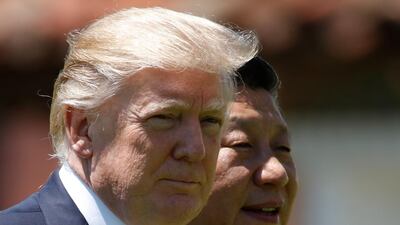As the world lurches from one geopolitical crises to another, especially between Russia and some major western countries, the relationship between the USA and China is also entering a cold spell following the glowing praises that US President Donald Trump heaved on Chinese President Xi in the USA last year at his Florida resort .
A major contention and what seems to be a red line for China is the complex issue of Taiwan. Mr Xi considers the signing of the Taiwan Travel Act by Mr Trump to be a severe - and deliberate - escalation of tensions in Sino-US relations, coming on the heels of already heightened feelings over trade.
While the Chinese can live with the potential upheavals of the US tariff hikes on imported Chinese products and see it as a starting negotiating point between the two countries, the Taiwan Travel Act has raised the stakes to a new level, and if Mr Trump were to allow the US Secretary of Defence or Secretary of State to visit Taipei, or welcome Taiwan officials to visit the White House, Chinese officials warn that Beijing will not hesitate to expel the US Ambassador to China, and to take "unprecedented retaliatory measures" that would deliver a heavy blow to US agricultural producing states and to the US financial markets given the large amount of Treasury holdings the Chinese Central Bank has, estimated at around $1.18 trillion in December 2017, the second-largest foreign holder.
To put this in perspective, the largest Arab US Treasury holding is that of Saudi Arabia's with $112 billion in January 2018. The total estimated Chinese foreign exchange reserves of around $3.14tn also highlights the significant overseas soft economic power the Chinese can deploy today, ranging from investments in Latin America, Africa and in the Middle East.
_______________
Read more:
WTO chief warns trade barriers will 'jeopardise global economy'
China hits back at Trump tariffs as trade war finally arrives
_______________
On the trade war front, the Chinese are set to prepare a full slate of countermeasures on trade, including specific and targeted actions against certain US goods through high retaliatory tariffs, and through the imposition of new, strict import standards. Beijing, nevertheless, does still interpret Mr Trump’s latest moves as "opening positions" in negotiations before the two leaders meet face to face, and believes the US president will continue to push for concessions from China even while averting an outright collapse in talks. They see the current tactics following the same template, albeit a much more alarming one, as the White House positioning in the run-up to the first Xi-Trump summit held at Mar-A-Lago in Florida last year.
With the signing of the Taiwan Travel Act, on the heels of heightened tensions over trade, and the firing of Secretary of State Rex Tillerson in favour of the more hawkish CIA Director Mike Pompeo, Beijing is bracing for a period of instability in relations with the US for months to come, relations some believe will remain on a knife’s edge until the two leaders agree to their first summit of this year. The Chinese have issued the first warning shots and already five departments including, most pointedly, China’s Ministry of National Defence, warned that the Trump administration should refrain from the implementation of relevant clauses of the travel act, and stop seeking any official contacts and military ties with Taiwan. Mr Xi has made it clear that he considered it a deliberate provocation by Mr Trump himself.
The act, though not legally binding, is said to “severely violate” the One-China principle, as well as the three joint communiqués the US signed with the People's Republic of China. Foreign Minister Wang Yi for his part also lodged a formal protest and “stern representations” over the act . Mr Wang relayed China’s position that it will take all necessary measures to deal with the situation if US warships were to anchor in Taiwanese waters.
With Mr Trump’s recent sacking of several key administration officials, Chinese officials expect policy from Washington to continue to turn more hawkish and confrontational. They are specifically alert to the implications of the recent firing of Mr Tillerson, and believe Mr Pompeo may prove to be the most hostile US Secretary of State to China in recent US history.
With Mr Trump’s already tough stance on Sino-US bilateral trade, Taiwan, and the South China Sea, officials in Beijing are now bracing for instability in Sino-US relations for months to come. This is one more headache the world can do without and it has long term implications for Arabian Gulf countries trying to juggle their relationship with the two global superpowers.
Dr Mohamed Ramady is an energy economist and geopolitical expert on the GCC, and former professor at King Fahd University of Petroleum and Minerals, Dhahran, Saudi Arabia, and co author of 'OPEC in a Post Shale world – where to next?’. His latest book is ‘Saudi Aramco 2030: Post IPO challenges'.

